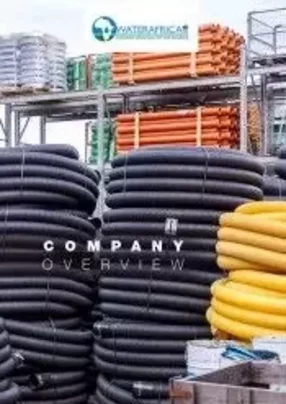Water Africa is making and supplying vital products for civil and industrial projects across South Africa and further afield as it continues to build up assets and grow strongly.
The cornerstone of this has been the company-led manufacturing of hoses from its Johannesburg facility, with new hoses set to enter the market this year. This is not forgetting the continuing trading partnerships with other manufacturers, for whom it distributes products straight to project sites, acting as a one-stop-shop for all contractors.
With Directors Wayne Grace and Ronnie Dennison involved in the trading of water pipes, hoses and other related goods and systems since the 1980s, Water Africa came together in 2010 and has not looked back, building on established relationships with clients.
The company is now looking to expand its presence not only geographically across Africa but also in terms of industrial sectors, with mining a particular focus moving forward.
Grace said: “Now we have added the assets and manufacturing facilities we have a great base and can build around this. We are well situated to get to all of our project areas and have extremely good staff throughout the country looking after our businesses.”
Growing with demand
Water is arguably the most precious resource on the African continent, and in South Africa the demand is surging as the country’s economy develops and diversifies.
Water Africa is not only able to provide all necessary hosing and piping products for water services, sanitation, plumbing, building and irrigation projects, but also on hand to train and advise engineers.
“Our growth has been driven by civil infrastructure as there is a huge demand for water and sanitation in South Africa and the whole continent,” Grace added. “It has come from going into the hoses business where we have had around 30-40 percent growth from 2010 to now.
“Because there has been such a big move from rural to urbanisation there is a massive demand for this and a huge backlog that needs to be tackled. The older systems are not designed to deal with the numbers of people now living in the built up areas.”
Asset base
Water Africa manufactures its hoses in Johannesburg, while also participating in joint ventures in the production of PVC with HMT Projects and Mining Pressure Systems. Further offices in South Africa can be found in Durban, Limpopo, Bloemfontein and Mbombela.
Its own manufacturing facility comprises five exclusion lines, while the company also takes up around 80 percent of production for HMT and 60-70 percent for Mining Pressure Systems, creating products relevant to the projects Water Africa supplies, civil infrastructure and agriculture being two key areas.
New hydraulic hoses will help the business make further inroads into the mining sector this year, a key part of its expansion plans.
“We want to move up as far as Tanzania and the Congo through finding agents in those areas,” Grace added. “This will involve going to a lot of mining and industrial shows in those countries where we can explore and find these agents.”
“We are already involved in several agricultural projects in Zambia, Mozambique, Angola and some other countries through third parties. Now it is time for us to get further into the mining industry as well as this is a great growth area for Africa, and in Zimbabwe we have two contracts already in what is a fast-growing market. It will give our hose factory sustainability.”
Project pipeline
Enhancing Water Africa’s growing reputation is a strong portfolio of completed projects across Africa, with Grace adding that the company has anywhere between 30 and 50 separate involvements in programmes going on at any one time.
Such projects vary greatly in terms of size and nature, varying from supply-only and specialist welding to training and full installation.
At the Waterkloof Airbase on the outskirts of Pretoria, South Africa, Water Africa was responsible for the water and sewage works on a project which saw the construction of two new runways. In total the four-year development was worth R250 million to the company.
In terms of delivering products to various works across the continent, Water Africa has its own fleet of 5-8 tonne trucks and also makes use of local transportation companies for heavier loads in partnerships that stretch back for many years.
Grace said: “These are operators we have been dealing with for the last 10-15 years which have grown with us. To successfully trade in South Africa you must get your BEE score and we concentrate our procurement operations on building up a competitive rating. If you don’t have the right BEE score, you will not pick up business.”
The director also has his own team of 75 staff to draw upon, all of which put through various training programmes on equipment, maintenance and new technologies, with the sales team being trained in-house.
Through continuing to supply, train and carry out work at important infrastructure and industry projects across South Africa and beyond, Water Africa looks set to grow off of its manufacturing asset base and into other territories and industries like mining. Such growth potential excites Grace, who believes there are many positive directions the company can take in the coming years.
He said: “Both mine and Ronnie’s sons are in the business and still in their twenties, and we want them to come into management roles by the time I step aside in about ten years.”
The pair have a succession plan in place for sons Ryan and Jermaine to take control of operations, and the future looks bright for when the transition is complete.
Grace concluded: “There are many people looking at investing in this type of industry which opens up possibilities of bringing in partners, listing on the stock exchange and securing extra funding. This is where building up assets has been vital.”


